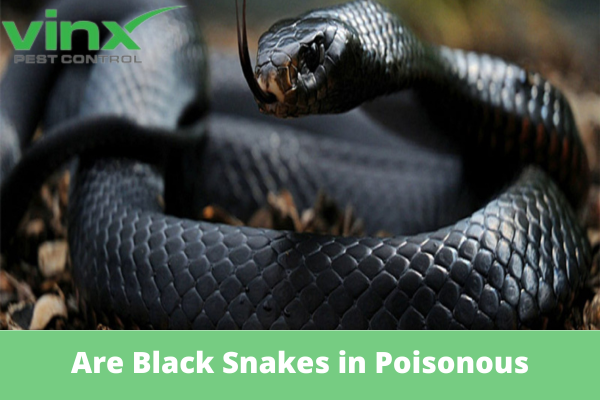Are all snakes Poisonous? Facts About Black Snakes and Their Behavior
Introduction
Black snakes are commonly found across the Eastern and Central United States, including South Carolina, Texas, and Virginia. Many homeowners worry about their presence and often ask, “Are snakes poisonous?”
Most black snakes are non-venomous and help control pest populations by feeding on rodents, birds, and small reptiles. However, misidentification can lead to unnecessary fear. This guide will explain different types of snakes, how to identify venomous vs. non-venomous species, their behavior, habitat preferences, and what to do if you encounter one on your property.
Are Black Snakes Poisonous?
The majority of snakes in the United States are not poisonous. The term “black snake” refers to several species, most of which are harmless and beneficial to the ecosystem. While they may appear intimidating due to their dark coloration and length, black snakes are generally shy and avoid human interaction.
Common Non-Venomous Black Snakes
Eastern Rat Snake (Pantherophis alleghaniensis)
- Also known as the black rat snake, it is non-venomous and an excellent rodent hunter.
- It can grow up to 6 feet in length.
- It constricts its prey before consuming it.
Black Racer (Coluber constrictor)
- Fast-moving and non-venomous, this snake avoids human interaction.
- It is often mistaken for a venomous snake due to its speed and defensive behavior.
Black Kingsnake (Lampropeltis getula nigra)
- Non-venomous and known for eating other snakes, including venomous species.
- It has a smooth, glossy black appearance with occasional white speckling.
Venomous Snakes That May Be Mistaken for Black Snakes
Although most black snakes are harmless, some venomous snakes share similar dark coloration, leading to misidentification.
Cottonmouth (Agkistrodon piscivorus)
- Also known as the water moccasin, it is semi-aquatic and found near swamps, rivers, and lakes.
- It has a thick, muscular body and a distinctive white-lined mouth.
- Unlike black racers, it tends to stand its ground rather than flee.
Timber Rattlesnake (Crotalus horridus)
- While usually patterned, some melanistic individuals appear nearly black.
- It has a triangular head and a distinctive rattle at the end of its tail.
- Found in forests, rocky hillsides, and near farmlands.
How to Identify a Venomous vs. Non-Venomous Black Snake
Knowing the physical and behavioral differences between venomous and non-venomous black snakes can help determine whether a snake is dangerous.
Non-Venomous Black Snake Features
- Round pupils
- Slender head that blends into the body
- Smooth scales
- No heat-sensing pits between the eyes and nostrils
- Passive behavior, likely to flee when approached
Venomous Black Snake Features
- Triangular-shaped head
- Vertically slit pupils (cat-like eyes)
- Pit organs between eyes and nostrils (heat-sensing pits)
- Rattling or hissing as a defense mechanism
- Defensive coiled posture before striking
Where Do Black Snakes Live?
Black snakes thrive in various environments, often choosing secluded areas where food is abundant.
Common Snake Habitats
- Fields and farmlands
- Barns, sheds, and attics
- Under logs, rock piles, and debris
- Near lakes, rivers, and wooded areas
- Inside crawl spaces and basements
Non-venomous black snakes are often found in human-inhabited areas because they help control rodent populations. They are excellent climbers and may be spotted in trees or on roofs searching for food.
What to Do If You Encounter a Snake
If you see a black snake in or around your home, follow these steps:
- Observe from a safe distance – Avoid making sudden movements that could startle the snake.
- Identify the snake – Use the identification guide above to determine if it is venomous or non-venomous.
- Do not attempt to handle it – Even non-venomous snakes can bite if threatened.
- Allow it to leave on its own – Most snakes will flee when given space.
- Contact a professional if necessary – If a snake is inside your home or in a high-traffic area, a wildlife removal expert can safely relocate it.
How to Prevent Snakes from Coming Near Your Home
Snakes typically seek shelter in areas with abundant food sources. Reducing their access to prey, water, and hiding spots can help deter them.
Best Practices to Keep Snakes Away
- Seal entry points – Close gaps in foundations, doors, and window frames.
- Eliminate rodent populations – Since many black snakes feed on mice and rats, reducing these pests makes your property less attractive.
- Keep the yard tidy – Trim grass, remove debris, and store firewood away from the house.
- Secure pet food and trash cans – Open food sources can attract rodents, which in turn attract snakes.
- Use natural deterrents – Some homeowners use essential oils like clove or cinnamon to discourage snakes from nesting near their homes.
For more wildlife prevention strategies, visit [Pest Prevention Tips for Homeowners].

Conclusion: Are Black Snakes Poisonous?
The majority of snakes in the U.S. are not venomous and pose no threat to humans. In fact, they play an essential role in maintaining a balanced ecosystem by controlling pest populations.
Key Takeaways:
- Common non-venomous black snakes include the Eastern Rat Snake, Black Racer, and Black Kingsnake.
- Some venomous snakes, such as the Cottonmouth or Timber Rattlesnake, can be mistaken for black snakes.
- Learning how to identify snake species can help you determine if a snake is dangerous or harmless.
- Simple prevention techniques can reduce the likelihood of encountering a snake on your property.
If you’re unsure about a snake in your area, it’s always best to contact a professional wildlife expert for assistance.
For more information on local wildlife, visit our Pest Learning Center.



